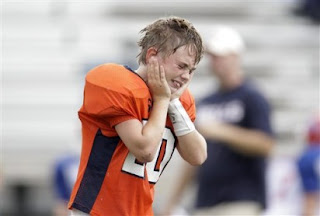I'm not a parent. At this stage of my life it's not going to happen. So, I don't ever have to answer the question of whether I'd allow or encourage a son of mine to play football, at any age. (Frankly, if we'd ever had kids we'd be far more likely to nudge them towards music, which has its own character-building virtues.)
That doesn't stop me from wondering at the thought processes of those who either do have to make such decisions, or those who are in the professional medical position to do so. The former number has occasionally included some famous individuals, even football players, who have chosen to encourage their male children towards other pursuits.
I can only imagine that's a hard position to be in. One might think of, say, coal miners or factory workers who imagined themselves to be working in those fields so that their sons didn't have to do so (although I imagine there were also plenty who expected their sons to follow in their footsteps), but that's not quite the same thing. Playing Pop Warner football or even high school ball doesn't necessarily lead to an NFL career. I suppose there's a greater chance that playing Pop Warner or high school might be more likely to produce a desire to play in the NFL, but the Rolling Stones have the answer to that.
I have to imagine that it's a particularly challenging time to be a medical professional where this subject is concerned, though. By this time it's hard to imagine doctors being completely blind to CTE and its effects on individuals long-term. Even most NFL players don't stay in the game for twenty years, a la Mike Webster, but not all former NFL players who manifested the disease were that old -- think of Paul Oliver, who was only 29 at death, with advanced CTE. Chris Henry was only 26 when he died, also with CTE manifest in his brain; Adrian Robinson was only 25 when he committed suicide this past April, also showing the telltale markers of CTE. Advanced age isn't mandatory.
Of course, even younger players can manifest signs of potentially debilitating brain trauma, without having concussions, as this study among others reminds us. That study focuses on players in college, and not exactly football factories at that.
Fine. Just walk away after high school, right? Hmm...that might not even work out for the best. Even as that study insists that science can save us all, it also reminds that these things do start to show up in young players, and that concussions aren't required to do the damage. The particularly chilling part is that even an offseason doesn't always provide enough time for the traumatized brains to recover. And yes, even a few who didn't play beyond high school have ended up severely traumatized, apparently.
Even at the youngest levels these kinds of brain injury really can occur, in many different sports. One neurosurgeon/Pop Warner parent puts his opinion in writing here.
In "walking down the stairs" through these various age brackets and their potential for harm, I have to admit that I'd have a hard time with the idea of a child of mine playing football. If anything I'd be concerned that (despite the obvious genetic handicaps he'd bring to the game) he might be good at it. Do I then have the nerve to be vigilant about monitoring his brain health? Do I have the nerve to say "that's it, no more" if a young boy of mine suffers a concussion, as Dr. Powers says he will do above?
But as noted, I'm not a parent, so I'll never have that decision to make.
Anyway, it turns out that one of the doctors depicted in the movie Concussion (not a major character in terms of screen time, but an important one to the plot), discussed in the previous post on this blog, is now at work at the large state university in the town where I now live, and the local paper took note of that in today's edition. It's an interesting interview, in which he recalls the initial results and the pressure applied by the NFL (he was a co-author on the study the NFL demanded to have retracted).
And yet, at the end of that article, this physician pronounces those parents who decide to steer their children from football to be guilty of overreaction.
"Understandable overreaction," to be sure, but overreaction. Geez, how charitable of you.
It's pretty unlikely I'll ever meet the man (I am nobody, after all), but if it ever were to happen I'm not really sure I'd be interested in any long conversation with him. My contribution to the conversation would likely be kept to a question:
What would it take for you to decide that such a choice wasn't an "overreaction"? Dead children?

No comments:
Post a Comment